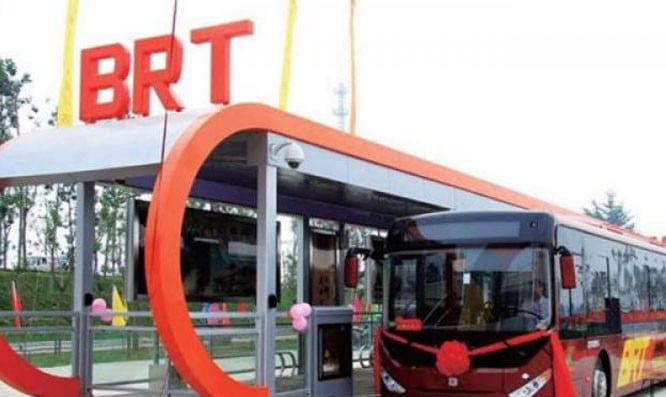
The BRT has become a sore point for the government in KP as questions about its escalating costs and delay in completing the project are frequently asked

The new completion date of the Bus Rapid Transit (BRT) in Peshawar is March 23, 2019 but doubts are being openly expressed if this latest deadline for its ‘soft opening’ could be met.
The word soft opening is being used as the Pakistan Tehreek-e-Insaf (PTI) government in Khyber Pakhtunkhwa (KP) and the project’s executing agencies such as the Peshawar Development Authority (PDA), the provincial Transport Department and the company assigned to operate the metro bus are all aware that the full completion and running of the Rs66.437 billion BRT won’t be possible until June 2019.
The BRT costing Rs66 billion is the biggest project in the history of KP. In fact, it is one of the two flagship projects of the PTI government in KP. The other is the 81 kilometre long Swat Expressway linking the Karnal Sher Khan Interchange on the Peshawar-Islamabad Motorway in Swabi district to Chakdara in Lower Dir district costing Rs40 billion. The work on the two projects started during the party’s previous stint in power in the province from 2013-2018 and both are running behind schedule.
The BRT has been haunting the PTI government since the summer of 2018 when it was supposed to be inaugurated. The then Chief Minister, Pervez Khattak, had boasted that the project would be completed in six months before the general election due in July 2018. It wasn’t possible but the chief minister kept pushing for its completion and even fired a few officials for failing to keep up the pace of work. Options were considered for running a bus on part of the BRT from the side of Chamkani, a village on the outskirts of the project, and celebrating its ‘soft opening’ in the hope of using it as a slogan in the election campaign. All these plans failed to materialise and provided an opportunity to critics of PTI to question its claims and performance.
Certain PTI leaders are now conceding that the BRT had become a sore point for their government in KP as questions about its escalating costs and delay in completing the project are frequently asked. Among them is KP’s senior minister Muhammad Atif Khan, who narrowly missed becoming the chief minister when the Swat lawmaker Mahmood Khan was surprisingly preferred for the job by Imran Khan. He even admitted that the PTI government knew that BRT’s completion period was 18 months, even then Pervez Khattak tried to complete it in six months. Atif Khan argued that projects of such magnitude take time as similar metro projects elsewhere in Pakistan had taken about one and a half year to be completed.
Questions have also been raised about the rationale behind the decision to build the BRT in a congested old city like Peshawar when the PTI head Imran Khan used to ridicule the Pakistan Muslim League-Nawaz (PML-N) government of Prime Minister Nawaz Sharif for building the costly metro bus projects in Lahore, Islamabad and Multan instead of spending money on public welfare and education and healthcare schemes. He even used to accuse the Sharif family of approving mega construction projects to make money. However, Imran Khan couldn’t stop his party’s government in KP from undertaking the mega BRT project after having declared that the PTI won’t waste money on such wasteful projects. It is now even possible that Prime Minister Imran Khan may inaugurate the BRT in case its soft opening as scheduled happens on March 23.
The work on the BRT had started with much fanfare on October 20, 2017 amid claims that its cost would be less than the metro bus projects undertaken by the PML-N government in the centre and Punjab. The BRT has been co-financed by the Asian Development Bank which gave $335 million, the French Development Agency that loaned 130 million Euros (Rs19.5 billion) and the KP government. Despite the obvious delays caused by changes in design, the PDA has continued to insist that the BRT is in its final stages of completion as the corridor is 90 percent complete and work on the bus stations is in full swing.
A recent report compiled by the Directorate of Monitoring and Evaluation, Planning and Development Department, KP said the BRT is unlikely to be completed by March 23. It noted that some of its major features such as universal accessibility (escalators, lifts and ramps), footpaths and cycle track have been compromised to meet the March 23 deadline for its soft opening. It also highlighted other incomplete features of the BRT and said the work at certain places is sub-standard.
Though the PDA, the BRT’s executing agency, maintained in a recent statement that the project’s cost hasn’t escalated as it is still Rs66 billion that was approved by the ECNEC late last year, the National Accountability Bureau (NAB) while ordering investigation into the project in November 2018 had noted that its cost had increased from Rs49 billion to Rs64 billion. The NAB said it would fix responsibility for the increase in the cost and delay in completion of the project. The NAB investigation is continuing and nothing has been proved yet.
The PTI government has also come under scathing criticism from the opposition parties for the delay and cost of the BRT. This criticism isn’t going to stop even if the project is completed and buses start running on the 26 kilometres corridor, including 14.8 kilometres of its at-grade section. The critics have pointed out that the running cost of the BRT is going to be high and would require subsidies. The ruling PTI, however, is hopeful that the benefits from the BRT once it becomes operational would outweigh the costs and delays and also the suffering caused by the pollution and traffic jams during the construction of the project.